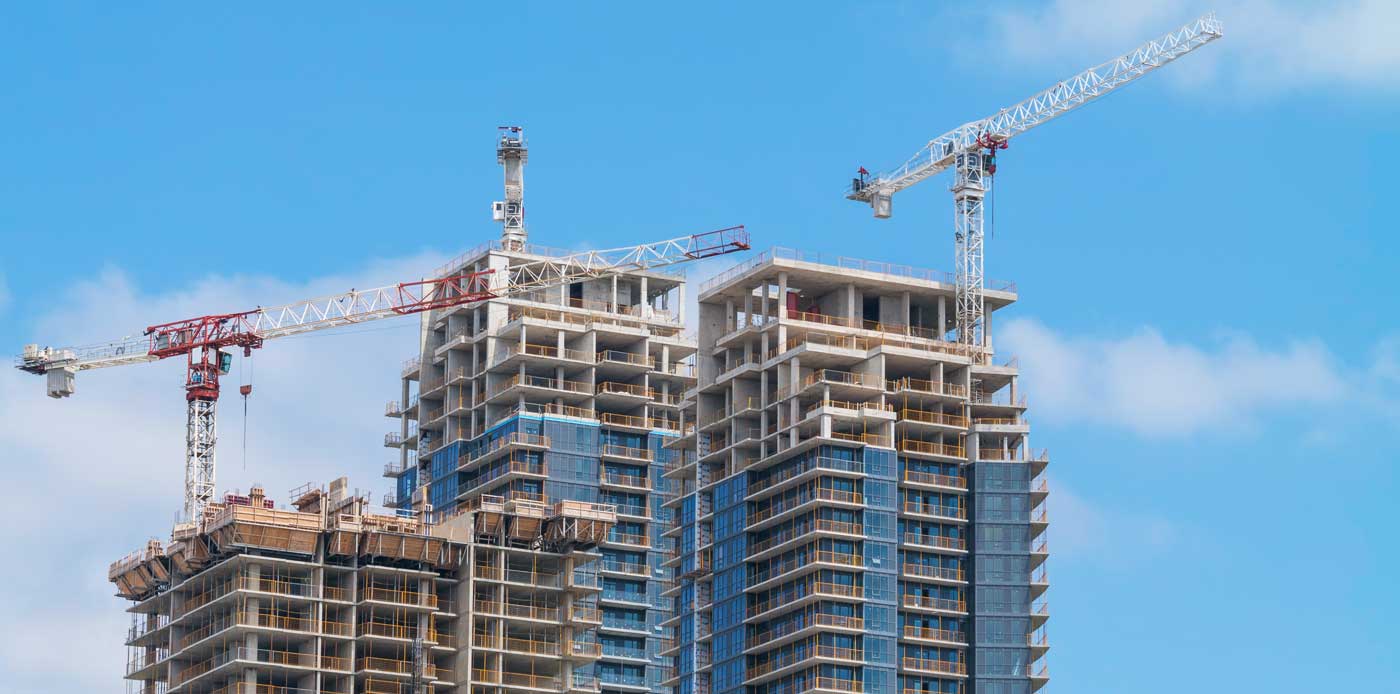If you live in Downtown Toronto, you can attest to the fact that its skyline is scattered with cranes, its soundscape is mainly comprised of digging and drilling, and its road closures are abundant. Now that we've set the tone, the premise of this article is a byproduct of the emotion-inducing, 12-letter word: construction. In this article, we'll be diving deep into assignment sales; what they are, what makes them different, and the tips you need to know in order to smooth sail your way through the assignment sale process.
What is an assignment sale?
In order to understand what an assignment sale is, we'll need to touch on pre-construction properties. Buying a pre-construction property means that you purchase a property before it's ready, sometimes even before its construction has even begun. Building developers usually start pre-construction sales early on, meaning you can buy a condo in a coveted building and desirable area for a fairly reasonable price (sounds impossible, right?) - but here's the catch, it won't be ready for a couple of years. The upside is that it will most likely have appreciated in value by the time you receive it, making it a smart investment. As soon as you buy a pre-construction property, you are entering an agreement with the builder until the property is ready.
Now an assignment sale is when the original buyer of a pre-construction property sells their contractual interest in the property to a new buyer, meaning that they resell the pre-construction property before taking possession of it. The sale must be done before the original buyer takes registered possession of the home for it to be considered an assignment sale. As such, the second buyer (the purchaser of the assignment sale) is the one who completes the transaction with the original seller (the builder). To put it simply, it's basically a purchase of the agreement between the builder & the original buyer, so that the new buyer automatically becomes the new owner of the property once it's completed.
How do assignment sales work?
Since we've covered the assignment sale basics, let's get more technical - the property being sold is still not registered with the land registry office and is probably still under construction. This makes it quite different from a regular sale, in more than one way. Let's get into the main attributes that make this type of purchase unique.
A Larger Deposit
When purchasing a property via assignment sale, there is usually a larger than normal deposit. The deposit in an assignment sale takes into consideration the deposit paid by the original buyer to the builder (usually 20%), plus additional profit that the seller is hoping to gain. Since the original buyer (now the seller of the agreement) is making a profit on the property above the downpayment already paid, these assignment sales can be very cash intensive - this is the single biggest deterrent for most buyers.
For instance, Buyer A purchases a pre-construction property from the developer of the project (the builder) for $500,000. Buyer A pays a 20% deposit ($100,000) over a two year span to the builder. Before the project is completed, Buyer A decides that they are no longer interested in going through with the purchase and would like to sell the unit, at this point (two years later) the market price of the property has now reached $550,000. Buyer A lists the unit for sale for $550,000, and the new buyer (Buyer B) would have to pay Buyer A their original deposit of $100,000 (20%), plus the property's appreciation of $50,000. The total deposit that Buyer B will have to pay is $150,000 which, at this point, would be higher than the 20% usually required to obtain a mortgage on an investment property.

Builder's Requirements & Consent
Another factor to keep in mind is that the assignment sale cannot take place without the builder's consent. If you're thinking of buying a pre-construction property only to then re-sell it as an assignment sale and turn a profit, this is definitely a factor worth considering. The builder reserves their right to hold back on consent for assignment sales and most only allow one assignment to be completed prior to final closing.
Therefore, as the buyer in an assignment sale, you'll only be able to take over the original purchase agreement between the builder and Buyer A with the consent from the builder. This usually entails the builder requiring mortgage approval documents, ID, and additional information from the new buyer. Then there would be an assignment agreement executed between the builder, original buyer, and you (the new buyer). Needless to say, this is not the case with a regular sale - in a regular sale, the only consent you will need is that of your own and the seller.
No Showings
Adding to the growing list of factors that make the assignment sale process different, showings do not exist here. Since, in most cases, an assignment sale is done before the building is even ready, the buyer is unable to physically see the property before purchasing it. As the buyer in an assignment sale, you'd be able to see floor plans, mock-ups, and images. In some cases, you'd also be able to head to the builder's sales center and see/touch the finishes (eg. kitchen cabinets, countertops, tiles, appliances, etc.). You may also see the status of construction of the building by visiting the development site, to get an idea regarding the stage of project.
Since this requires a lot of trust, we recommend doing your research on the city's reputable builders & the neighbourhood of the development to make sure its the right for you. It's worth noting, however, that if the assignment sale is taking place during occupancy - when the original buyer has occupied the unit but is not yet in full possession of it - you might be able to see the unit in person.
Increased legal fees
Within the process of an assignment sale, you'll find that there is additional paperwork (Builder's consent, assignment agreement, etc.) and stages (occupancy closing, final closing, etc), which in turn leads to more legal hours. Lawyer fees for these types of sales are usually higher than a traditional sale because there are more contractual technicalities involving more than one party (Buyer A, the builder and Buyer B). Our advice would be to discuss these fees with your lawyer, in order to paint a more accurate picture of the what you can expect.
Occupancy Fees
When buying a property via assignment sale, you are essentially buying a pre-construction property through a third party (Buyer A). With pre-construction properties, you get physical possession of the home (known as occupancy) before you get full possession of the home on paper (known as final closing). Therefore, occupancy fees are fees that you have to pay from the time you get possession of the home (occupancy phase) until the time you take official title of the property (final closing). Final closing usually occurs after the building is completed and has reached a certain percent of total occupancy. At final closing is when you would your mortgage would kick in. During the occupancy phase, you can expect the occupancy fees to be roughly the same amount as your mortgage payments would be with 20% down.
Additional Closing Costs (Levies)
To add to what seems like the never-ending fine print, you might come across a number of additional fees when it comes time for final closing. Most contracts with a builder state that the buyer might incur additional costs that will only be specified upon final closing. The main additional fees are levies charges, also known as development costs; these are costs that the builder incurred while constructing the building, which they pass on to you as the buyer.
The size of these fees really depends on more than one factor: the builder, the city, and the project are a few to list. However, in most cases, you may have the builder set an upper cap limit on these fees - also known as Capped Levies. That way you know that the additional charges will be have a maximum upper limit that they wont exceed. Typically in Toronto, most developers cap development charges for one bedrooms to $7,500, $15,000 for two bedrooms, and over $20,000 for three bedrooms but please keep in mind that these are just ballpark numbers and the exact capped amount varies.
It's essential to look at the original agreement between the assignment seller and the builder to see if levies are capped and at what amount. If the levies are not capped, you will have to assume the risk of higher-than-anticipated closing costs at the time of taking title to the property. Of course, there are also the common costs associated with homeownership which include land transfer taxes, legal fees, and possible mortgage fees.
HST on Pre-construction
Last but not least, it's critical to consider HST (Harmonized Sales Tax) when buying via assignment sale, which essentially means you're purchasing a pre-construction property. As a buyer, the HST of 13% in most cases is actually already included in the purchase price of the pre-construction property and the builder then applies for their rebate. However, it's important to touch on the fact that buying a pre-construction property solely for investment may alter this structure.
If you are purchasing the property solely as an investor, and neither you or a direct family member will be occupying the unit, then you would have to pay the HST at final closing and apply for the New Residential Rental Property Rebate (NRRPR) after leasing the unit for one year. For more information regarding qualifications and the amount of the rebate, visit this publication from the CRA.
If you're purchasing the assignment for yourself and it will be used as a primary resident then you'll have to confirm that the HST is included in the purchase price of the assignment. For more information you may also visit the CRA's info sheet here.
When it comes to HST and the status of your occupancy, you should always consult with your accountants and lawyers as each circumstance is unique.

Why do people purchase/sell on assignment?
Well, after much unbiased consideration, it's safe to say that purchasing/selling on assignment can be a win-win scenario for both parties - the assignment seller gets a price above purchase price and the buyer, in most cases, snags a property below market price. Since assignment sales tend to occur well into the construction phase, there's also less risk imposed on the buyer in an assignment sale. That being said, there are a number of reasons why a person might want or need to sell/buy a property on assignment:
Selling Reasons:
- Change of plans: since pre-construction homes can take years to be completed, the original buyer situation could have changed within that time. For example, the original buyer may have started a family and is now looking for a larger, more suitable home.
- Financial trouble: the financial situation of the original buyer may have changed over the years, and they're now put in a position to have to sell the property. For example, the original buyer may have lost their job, meaning they can't get qualified for a mortgage and are now unable to complete the purchase.
- Profit: it's very common for investors to buy pre-construction homes with the aim of re-selling them to turn a profit. This is usually a common scenario for assignment sales in the Toronto real estate market.
Buyer Reasons:
- Brand new building/area: it can simply be that the purchaser is looking for a property that has never been occupied, or is in a newly developed neighbourhood, or just wants to secure a property in a new, buzz-worthy development. An example of this is Nobu Toronto.
- Below market price and less competition: since these purchases require at least 20% down-payment, in most cases it could be that these units have less competition and can be purchased at somewhat of a bargain.
- Profit: again, investors also look to buy properties via assignment sale because they believe that the building or neighbourhood will continue to appreciate in value, and come time of total completion or a few years later they would be able to sell for higher.
Looking to buy a home in Toronto or the Greater Toronto Area (GTA)? Message us via the live chat on Dwelly.ca and start the conversation.


